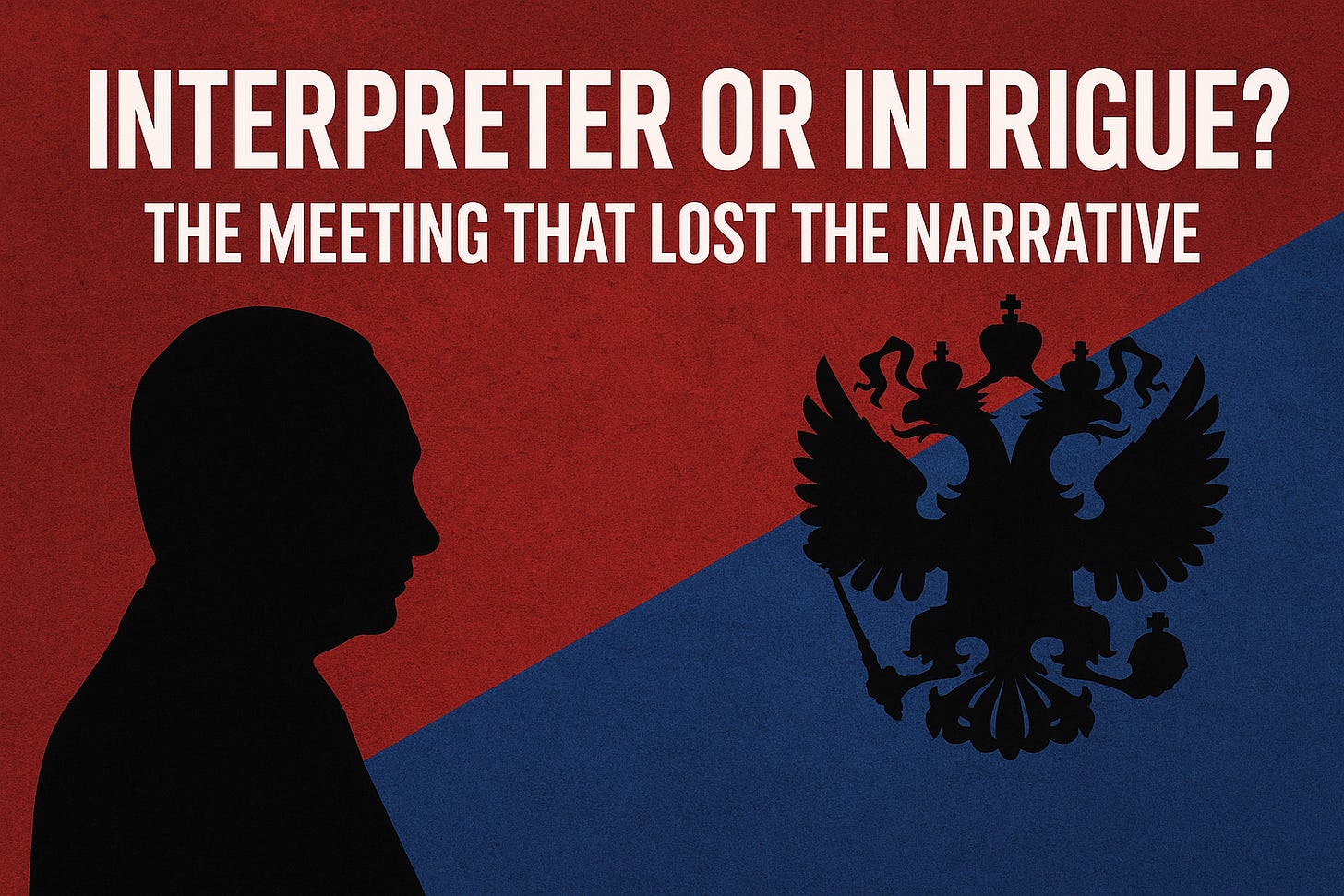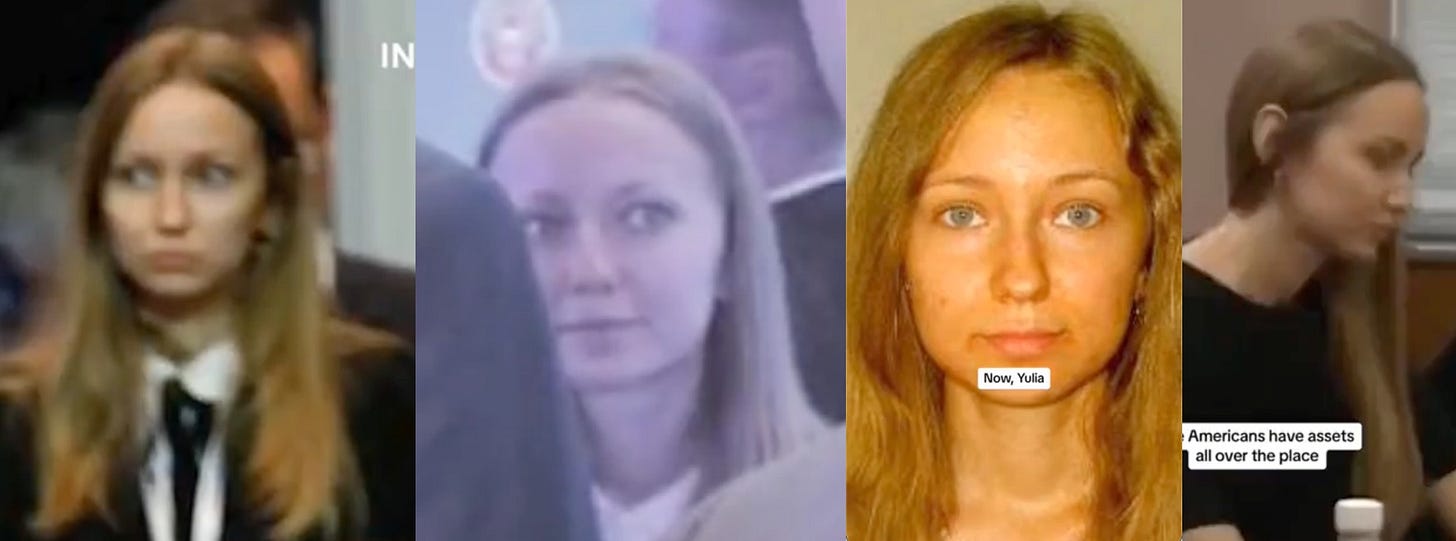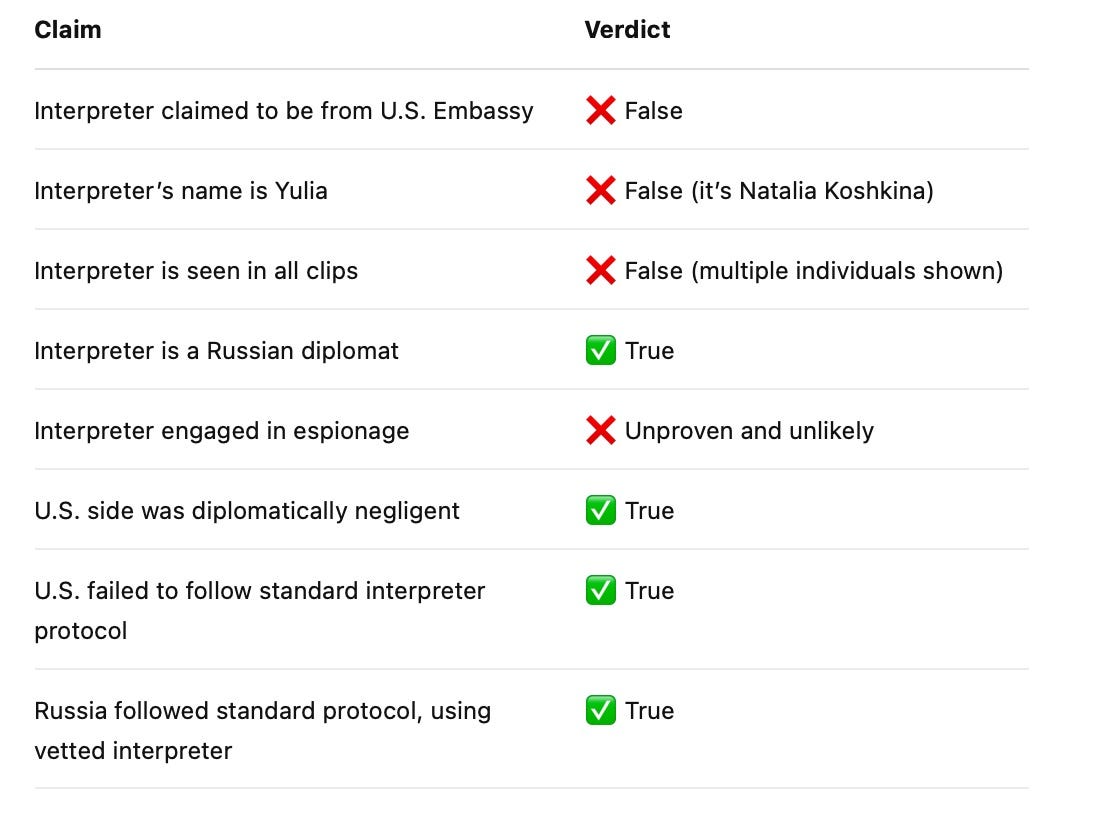Interpreter or Intrigue? The Meeting That Lost the Narrative
How a Witkoff's unscripted encounter with Putin exposed a failure in protocol—not a covert plot
Prepared by: Independent Analysis Unit, The Ministry of Absolute Truth™
Dispatch No. 25-0625-01
Issued: June 5, 2025
Classification: Public Enlightenment Directive
Subject: Interpreter or Intrigue? The Meeting That Lost the Narrative
🌍 Interpreter, Diplomat, Spy? The Natalia Koshkina Controversy Unpacked
🌐 Overview
In April 2025, U.S. real estate developer and Trump confidante Steve Witkoff traveled to Moscow for a private, unofficial meeting with President Vladimir Putin. During this meeting, Witkoff communicated through a Kremlin-appointed interpreter whom he assumed to be a U.S. embassy staffer. A viral blogger video claimed this interpreter was a Russian intelligence operative named “Yulia.”
In reality, the woman in question is Natalia Koshkina, a known Russian diplomat1. This report investigates her identity, the nature of the meeting, the misrepresentations in the video, and the broader diplomatic implications.
🔍 Identity Confirmed: Who Is Natalia Koshkina?
Name: Natalia Sergeyevna Koshkina
Born: 1991
Current Position: Second Secretary, Linguistics Department, Russian Ministry of Foreign Affairs
Notable Assignments:
Koshkina is a multilingual diplomat trusted by the Kremlin, frequently seen alongside top officials like Lavrov, Medvedev, and SVR chief Sergey Naryshkin.
🗨️ The Exchange at the Kremlin
As reported in the viral video, upon entering the meeting room, Witkoff turned to Koshkina and asked: “Interpreter?”
She responded affirmatively: “Mm-hmm.”
He then reportedly asked if she was from the embassy—but in the video, there is no audible response from her to that question.
At no point did she explicitly claim to be from the U.S. Embassy.
Misinterpretation: Witkoff likely assumed she was assigned by the U.S. side. This was never confirmed. Her only verbal statement was that she was the interpreter—a factually accurate claim. The absence of a reply to the embassy question reinforces that the misunderstanding was on Witkoff’s part, not due to misrepresentation.
🎥 Watch the Video Segment
Video Evidence: Watch the moment Witkoff meets Putin’s interpreter and misinterprets her role. Note the lack of audible confirmation when asked about embassy affiliation.
Note: This video is the original video analyzed in this report
⚠️ Diplomatic Breach: No U.S. Interpreter Present
Witkoff entered a Kremlin negotiation with no American interpreter or diplomatic handler. This violates basic diplomatic protocol:
No independent transcript of the meeting
Risk of manipulation in language and framing
Total narrative control ceded to the Kremlin
Had this been an official negotiation, the U.S. would have dispatched a State Department interpreter with security clearance. That didn’t happen—raising questions about whether the meeting was sanctioned at all.
🔧 Diplomatic Competence and Interpreter Protocol
❌ What Went Wrong:
No U.S.-appointed interpreter: Standard protocol in international meetings dictates that each side provides its own interpreter. Witkoff relied solely on the host country’s representative.
No credential verification: Witkoff accepted the interpreter’s presence at face value with a single-word confirmation. There was no confirmation of affiliation or clearance.
Lack of Embassy Coordination: There is no evidence that the U.S. Embassy in Moscow or the State Department was involved in arranging linguistic or diplomatic support.
✅ What Should Have Happened:
A U.S. Embassy-assigned interpreter (usually a U.S. citizen) should have accompanied Witkoff, providing accurate and independent translation.
This interpreter would have diplomatic clearance5, be trained in legal and political terminology, and possibly supported by a note-taker.
🖤 Why Interpreter Citizenship Matters:
U.S. interpreters are bound by U.S. law and security vetting, often with Top Secret or SCI clearance.
This ensures loyalty, confidentiality, and legal accountability.
⛔ Risks of Using Only a Host Nation Interpreter:
Translation bias: The host interpreter can subtly alter meaning or tone.
No U.S. transcript or record: No way to verify what was actually said.
Full narrative control: The Kremlin controlled not only the meeting, but how it would be portrayed afterward.
📚 Official Protocol References:
The U.S. Department of State’s Office of Language Services6 oversees interpretation for the White House and senior diplomatic officials, emphasizing professional standards and confidentiality.
It is standard practice that each side provides its own interpreter in formal diplomatic meetings to ensure mutual clarity and verifiability.
Interpreters must also adapt to the demands of security and protocol sensitivity, as detailed in U.S. Embassy SOW guidelines7.
Witkoff’s failure to follow these principles meant the U.S. forfeited both strategic and procedural safeguards during a sensitive encounter.
🇷🇺 Russia’s Interpreter Protocols:
Russian diplomatic protocol also requires the constant presence of an official interpreter during bilateral or multilateral meetings, even when the leader or diplomat understands or speaks the foreign language.
President Vladimir Putin frequently speaks English or German in informal or private settings, but during any official encounter, he always ensures a Russian interpreter is present.
This is not only for accuracy and legal record keeping, but also to maintain control over narrative, tone, and translation fidelity.
Russian interpreters at this level are highly trained civil servants or intelligence-cleared MFA linguists.
This makes Witkoff’s failure to bring his own interpreter even more glaring: he was speaking to a head of state who followed protocol to the letter, while the U.S. side brought neither linguistic control nor diplomatic structure to the conversation.
📹 Blogger Claims: Are All Women in the Video the Same?
The viral video splices together clips from different events, claiming that “Yulia” (actually Natalia) appears repeatedly at high-level meetings.
We extracted four frames for analysis:
Frame 1 (00:58): Woman with shoulder-length dark hair, sharp chin, and prominent cheek bones.
Frame 2 (01:20): Lighter hair, round face, thinner lips.
Frame 3 (01:26): Sharper jawline, distinct nose bent to the left, full eyebrows.
Frame 4 (02:10): Dark hair, stronger facial features, heavy cheek bones.
Visual Analysis Conclusion: At least two or more different women are shown. The blogger either misidentifies or deliberately conflates individuals to construct a single narrative.
🗃️ Do Russian Government Interpreters Work for the FSB?
Most Russian interpreters in high-level government settings are officially employed by the Ministry of Foreign Affairs (MFA) or Ministry of Defense, not the FSB (Federal Security Service). However, the boundary between diplomacy and intelligence in Russia is often porous.
🏛️ Institutional Structure:
Russian interpreters typically come from the MFA’s Linguistic Support Department.
Many are trained at elite institutions like MGIMO (Moscow State Institute of International Relations).
🕵️♂️ Intelligence Affiliation?
They are not formally FSB agents, but they usually undergo high-level security vetting.
Those placed in embassies, multilateral organizations (e.g., NATO, OPCW), or near top leadership are often:
Trusted by Russian intelligence
In communication with the SVR or FSB
Expected to provide narrative control and protect against foreign surveillance
🎯 In Practice:
Some interpreters serve dual roles: acting as both translators and informal liaisons to Russian intelligence.
Their proximity to decision-makers like Naryshkin (SVR) or Putin is both functional and symbolic.
Conclusion: Russian government interpreters are not spies in title, but their work is deeply embedded within the security and intelligence ecosystem. Natalia Koshkina fits this model: an MFA official entrusted with sensitive representation, not a covert operative.
🔎 Is Natalia Koshkina a Spy?
This claim, while sensational, is not supported by evidence.
Her official roles require security vetting and state loyalty—but this is typical for diplomats.
Her presence at NATO and OPCW conferences indicates diplomatic, not clandestine, work.
No record exists of her engaging in covert activity.
Calling her a “spy” is speculative and misleading. She is a career interpreter-diplomat serving in elite Russian circles.
🧳 Strategic Interpretation: Russia’s Advantage
From a strategic perspective, Russia played this flawlessly:
They supplied the interpreter, controlling the language and tone.
The U.S. side was unprepared, opening the door to misinterpretation.
By assigning a seasoned diplomat like Koshkina, the Kremlin ensured professionalism and leverage.
This is not espionage—it is optics control, a standard tool in modern diplomacy.
❓ Why Might Witkoff Have Avoided Bringing a U.S. Interpreter?
There are several possible reasons—strategic, political, or personal—for why Steve Witkoff may have intentionally chosen not to bring a U.S. interpreter to his Kremlin meeting. These are speculative, but grounded in diplomatic precedent, political behavior, and media narratives:
🔍 1. Plausible Deniability for the U.S. Government
By not bringing a U.S. State Department interpreter:
The meeting appears private, not official
Washington can distance itself from the conversation
No U.S. transcript exists—thus no accountability
🧩 2. Witkoff’s Possible Belief He Was Gaining Trust
He may have believed that arriving without a U.S. “chaperone” would:
Signal good faith to Putin
Appear more open or cooperative
Set the tone for more candid discussions
🔒 3. Avoiding Internal Leaks or Oversight
Bringing a State-vetted interpreter:
Adds a witness to the conversation
Means official records are created
Potentially opens up the meeting to U.S. intelligence review
💼 4. Business Mentality Over Diplomatic Protocol
As a real estate developer—not a diplomat—Witkoff may have:
Misjudged the importance of controlled interpretation
Assumed the Kremlin would provide a neutral interpreter
Believed trust and personal relationships mattered more than protocol
🎭 5. Political Theater or Distraction
The meeting may have been:
A trial balloon for backchannel diplomacy
A staged event to test public reaction
A narrative maneuver, knowing how media would respond
🧷 Summary Table
🏆 Verdict: What Actually Happened
🛠️ Conclusion
This controversy is not about espionage, but diplomatic competence. Witkoff’s lack of preparation handed full linguistic and perceptual control to the Kremlin. The mischaracterizations in the viral video further muddied public understanding by misidentifying Koshkina and overstating the covert angle.
Natalia Koshkina is not a spy. She is a highly placed interpreter-diplomat.
The failure here lies with the American side’s unprofessional execution of a sensitive meeting, not in a covert Russian deception.
🔖 Subscribe & Comply
💸 Truth is not free. It must be subscribed to.
Donate directly
💰 PayPal • Donation Alerts • Buy Me a Coffee • Boosty • YooMoney
🪙 Crypto: Contact us at truthministry@substack.com for our wallet details.
📡 Follow, obey, and remain informed:
🧠 www.ministryofabsolutetruth.org
📡 t.me/MinistryOfAbsoluteTruth
🐦 x.com/TruthMinistryHQ
▶️ youtube.com/@MinistryOfAbsoluteTruth
The Ministry salutes your obedience.





